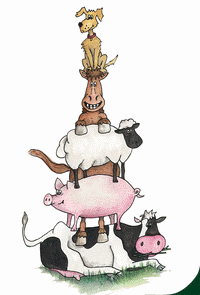Farmers, transport companies and ship operators involved in the export of live animals are set to face tougher controls over their business as ministers seek to allay welfare concerns over the treatment of livestock.
The subject of live animal exports and animal welfare was addressed and debated at the House of Commons on14 December 2012. Resulting in Food and Farming Minister, David Heath; announcing that there will be tougher welfare checks on all live animal exports. The debate followed the need for more reliable forms of transporting live animals after an incident in September at Ramsgate where more than 40 sheep died at the port.
Lame and injured sheep had been found unfit to travel after being transported on a lorry from Northhamptonshire. Two others drowned. The deaths happened after the RSPCA gave a report to the council highlighting the port's inadequate facilities.
There has also been growing unease among MPs over live exports following another incident, in November, when the ferry Joline was forced by bad weather to turn back while en route to Calais with hundreds of sheep.
Each year, millions of live farm animals around the world are transported thousands of miles for slaughter, or to places where they will be fattened for slaughter. This trade is a worldwide phenomenon. In North and South America, Australia and Europe, animals often have to endure journeys across vast distances before long voyages at sea to reach their final destination. Currently, British calves and sheep are being exported through the port of Ramsgate in Kent. Campaigners are determined to end this trade. However due to European Laws concerning the export of live animals, it is not possible to commence an all-out-ban at this time, so British MPs have made it their responsibility to encourage the EU to make a change.
The Animal Health and Veterinary Laboratories Agency (AHVLA) have been asked to increase inspections so that every consignment scheduled to pass through the port at Ramsgate is thoroughly inspected for any signs of distress or injury to the animals onboard. This increased level of inspections will remain until the Government is satisfied that there is no longer a high risk to the welfare of the animals involved in the live export trade.
The debate itself, covered key topics concerning the transportation of the animals, and the welfare of the animals themselves. Laura Sandys (Conservative, South Thanet) opened the debate, whilst opposition spokesperson, Jim Fitzpatrick (Labour, Poplar and Limehouse) followed by addressing the topic of animal transportation and questioned why "normal channel ferries on the Dover-Calais routes, which carry lots of goods, travel faster and are in better condition" were not used.
Sandys explained that certain ferry operators had banned the trade on their ferries and so a specific transportation mechanism was needed; “we are talking about a ship that is not equipped to go across the channel, despite our regulators saying that it is".
The Conservative MP argued that the transportation vessels used were equipped for fresh-water river crossings, but not for channel crossings in the middle of winter.
"We have already had a major crisis, when animals were taken halfway across the channel but had to return because the boat could not manage the seas", she added.
Sandys stressed her desire to ban live animal exports, stating: "the fact that there are few benefits to the trade is illustrated by the significant drop in the number of live animals being traded out".
Environment, food and rural affairs minister David Heath reminded MPs the UK had a "very good record at promoting animal welfare and ensuring that rules and laws are enforced".
"We would prefer to see animals slaughtered as close as possible to where they are reared, but while live animal exports remain a legal trade under European laws we must allow it to continue."
In areas of animal welfare, "there should not be ifs and buts-we simply need rigorous enforcement. People need to understand that", he said.
"There is already a regulatory framework. My task is to make sure that movements within this country comply with those regulations, and that we have the framework to make sure that that is the case each and every time."
"Our animal welfare laws must be followed to the letter so that no animal is made to suffer during transport. Until I am entirely satisfied that there is no longer a risk to the welfare of animals at Ramsgate, I have ordered AHVLA to check every consignment of live animals scheduled to pass through the port. The 100 percent inspection regime for transporters using Ramsgate will be retained for as long as I believe that the risk is high. I want a zero tolerance approach – if we find any evidence of slipping welfare standards then we will not hesitate to take action."
“In addition, following the shocking events at Ramsgate on 12 September, we are tightening up our procedures to deal with breaches of welfare standards. It is completely unacceptable that more than 40 sheep died unnecessarily and I am determined that this cannot happen again. I intend to visit the port at the next available opportunity and witness the loading and inspection process myself."
However, he concluded that he was confident that the AHVLA would "continue to take robust action against any transporter using poorly equipped or designed vehicles in the future".
The new measures are designed to ensure a government vet is always within an hour's travel of the port. Lorry companies carrying animals for export face more controls over their journey logs to ensure animals are not held in conditions that break EU welfare rules and exporters will also have to prove they have suitable contingency plans for emergencies. Reminders have also been sent to private vets who provide certification before a live export can begin, of the legal requirements. Whether these solutions will help the welfare of these animals, is yet to be seen, however hopefully it will put an end to unnecessary deaths during exports.

